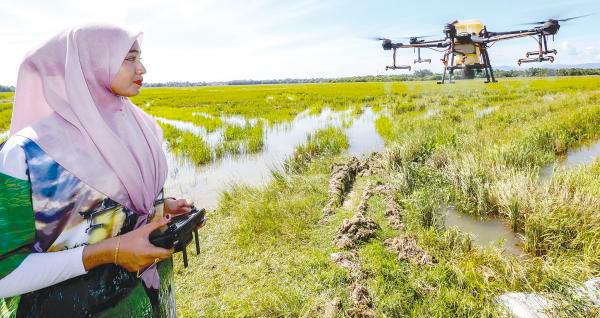PETALING JAYA: Universiti Malaya Institute of Biological Sciences Assoc Prof Dr Muhamad Shakirin Mispan said concerns about food security have sparked interest among farmers to embrace smart farming technologies.
“The increasing enthusiasm of many young farmers who are actively seeking ways to incorporate these techniques into their agricultural practices to increase yields is particularly encouraging.”
However, Muhamad Shakirin said a challenge lies in the absence of comprehensive cost-benefit analyses that illustrates the return on investment for farmers when integrating such technologies.
“The integration of technology in agriculture has substantially transformed the traditional narrative of ‘blood and sweat’ associated with physical labour in the fields.
“Smart technologies now offer farmers newfound opportunities in remote monitoring and management of their land.
“These technologies serve as useful instruments in assessing crop nutrition and water requirements, among others.”
He also said farmers often face hurdles in adopting smart technologies due to the initial investment costs, limited access to technology in rural areas and a lack of awareness on its potential benefits.
Muhamad Shakirin said the environmental factors in smart agriculture technology differ between urban and rural areas.
“When these innovations are correctly implemented, they hold the potential to enhance sustainable farming practices in both settings. Precision technology enables farmers to manage water and fertiliser usage more effectively. This minimises their impact on the environment by optimising resources.
“In urban areas, vertical farming and hydroponics enable cultivation in limited spaces. This again minimises the ecological footprint associated with traditional agricultural expansion.”
He also said the technology used could help to reduce the overall environmental effect of agriculture in urban and rural settings to raise output and profitability.
Universiti Teknologi Mara senior economics lecturer Dr Mohamad Idham Md Razak said agriculture technology advancements have significantly increased productivity and efficiency in Malaysia, leading to notable economic gains.
“Precision agriculture techniques, including soil mapping and targeted fertiliser application, have optimised resource use, resulting in increased crop yields.”
He said investments in research and development have produced high-yield, disease-resistant crop varieties, while greenhouse cultivation has ensured year-round production with enhanced crop quality.
He also said economic indicators affirm such progress after the Agriculture Department reported a 4.2% increase in total production since 2022. The World Bank also noted an 8% rise in the value of agricultural exports.
“The UN Food and Agriculture Organisation revealed a 15% reduction in pesticide use per hectare from 2015 to 2020, while the Malaysian Investment Development Authority reported a significant RM2.5 billion investment in the agricultural technology sector this year.”
Mohamad Idham said technology plays a pivotal role in enhancing the competitiveness of Malaysia’s agricultural products globally.
“It contributes to increase productivity and efficiency through precision agriculture, mechanisation and controlled environment agriculture.”









